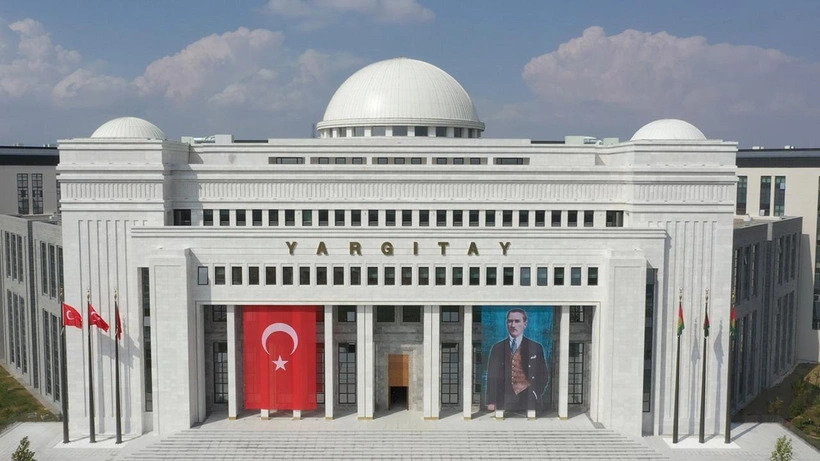Turkey’s Supreme Court of Appeals has elected as president Ömer Kerkez, a candidate not favored by President Recep Tayyip Erdoğan, in the 37th round of voting, ending a weeks-long delay and speculation about the court’s new head.
The court announced the election of Kerkez, head of the court’s 3rd Civil Chamber, on X on Tuesday.
— Yargıtay Başkanlığı (@TCYargitay) May 14, 2024
Kerkez, was elected for a four-year term, receiving 193 votes from members of the court, while his closest rival and the court’s incumbent president, Mehmet Akarca, who was seeking another term, got 103.
Akarca’s term in office expired on March 24.
The Supreme Court of Appeals has 348 members. A total of 324 valid votes were cast during Tuesday’s election.
The rounds of voting, which began on March 25, had to be repeated multiple times since none of the candidates managed to receive 175 votes, constituting a simple majority.
Last week another candidate, Muhsin Şentürk, announced the withdrawal of his candidacy in favor of Akarca, reportedly upon a demand from President Erdoğan.
Şentürk, known to be close to the far-right Nationalist Movement Party (MHP), is a controversial figure who, as head of the court’s 3rd Criminal Chamber, late last year and earlier this year refused to comply with two rulings from the Constitutional Court that found rights violations in the continued incarceration of opposition lawmaker Can Atalay, who gained parliamentary immunity with his election in May 2023.
Atalay remains in prison and stripped of his parliamentary status due to resistance from the Supreme Court of Appeals, which upheld his sentence in the politically motivated Gezi Park trial.
The court’s resistance to the Constitutional Court’s decisions on Atalay led to an unprecedented judicial crisis in Turkey which saw the filing of criminal complaints against members of the Constitutional Court by the Supreme Court of Appeals.
It has also raised concerns about the rule of law and the separation of powers in Turkey, with critics arguing that defiance of Constitutional Court’s decisions undermines democratic principles and legal certainty.
Power struggle
Meanwhile, the prolonged limbo in the election of the president of the Supreme Court of Appeals was said to be the result of a power struggle among followers of various political and religious groups within the court.
Kerkez is reportedly from the Hak-Yol religious goup, a sub-branch of the influential Nakşibendi sect, despite some claiming that he is from the Menzil sect, based in Adıyaman province in eastern Turkey.
According to journalist Alican Uludağ in Deutsche Welle’s Turkish edition, Kerkez is not from the Menzil sect since Menzil does not have sufficient power to get his candidate elected at the top appeals court on his own. However, he said Menzil followers at the court also supported Kerkez’s candidacy.
“He [Kerkez] was elected receiving support from every group among the top court’s members. He has a nationalist-conservative attitude but relatively more moderate,” Uludağ tweeted, describing the election result as a “critical crossroads” in Turkey’s high judiciary.
According to journalist İsmail Saymaz, the members of the Supreme Court of Appeals were uneasy with the efforts of President Erdoğan to influence the election by ensuring the withdrawal of Şentürk’s candidacy in favor of Akarca and elected Kerkez instead.
New chief prosecutor
The Supreme Court of Appeals also held a vote to elect its chief prosecutor on Monday as the four-year term of incumbent prosecutor Bekir Şahin will expire on June 4. Şahin is the prosecutor who filed a closure case against the pro-Kurdish Peoples’ Democratic Party (HDP) in March 2021 on terror charges. The case is still pending at the Constitutional Court.
President Erdoğan will appoint the chief prosecutor from among the five candidates who received the highest number of votes from the court’s members. Şentürk, who failed to be elected the court’s president, is among the candidates.
The Turkish judiciary faces widespread criticism for its perceived lack of independence. Critics accuse Erdoğan of exerting control over the judiciary and establishing one-man rule in the country, particularly after a coup attempt in 2016, following which he launched a massive crackdown on non-loyalist citizens and the country’s subsequent transition to a presidential system of governance, which granted him vast powers.
Many say there is no longer a separation of powers in the country and that members of the judiciary are under the control of the government and cannot make judgments based on the law.
In a development that validated the critics, Turkey was ranked 117th among 142 countries in the rule of law index published by the World Justice Project (WJP) in October, dropping one rank in comparison to last year.



